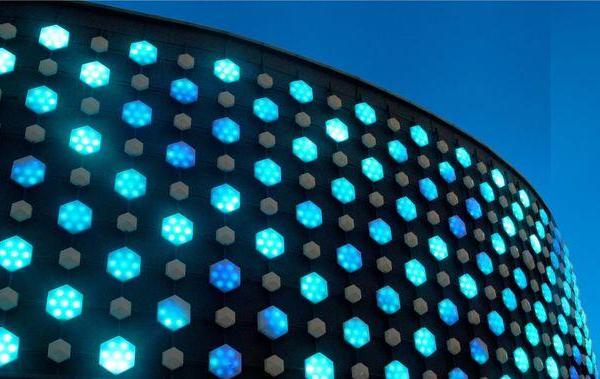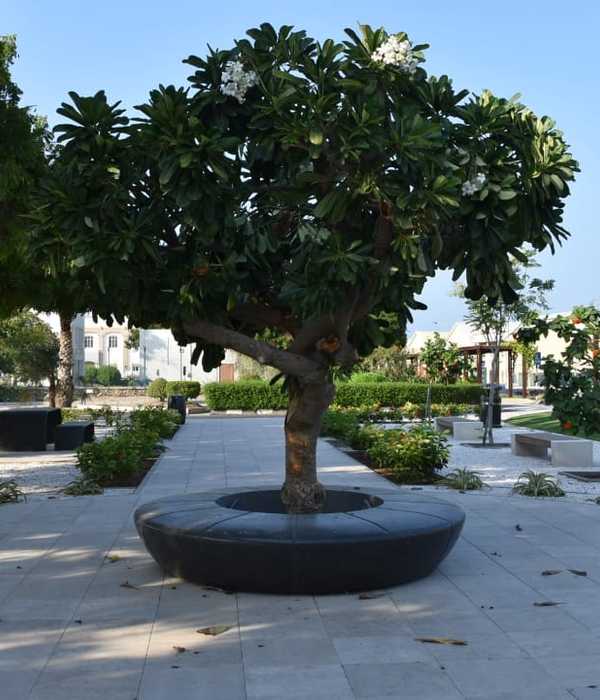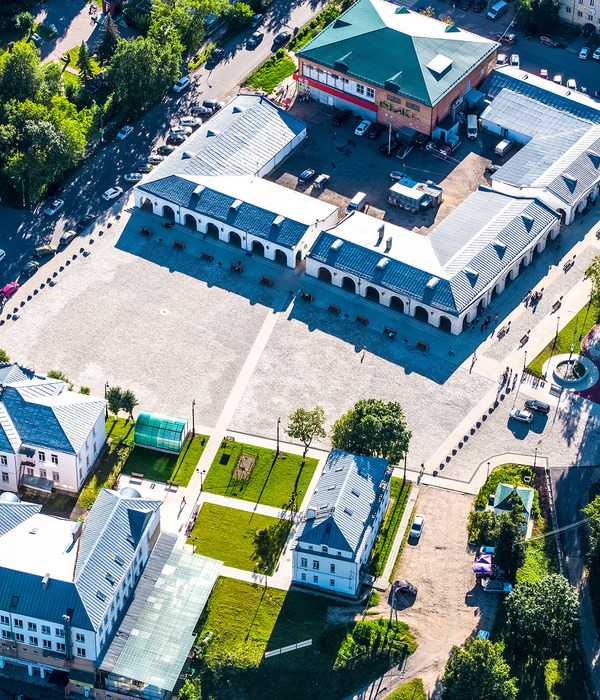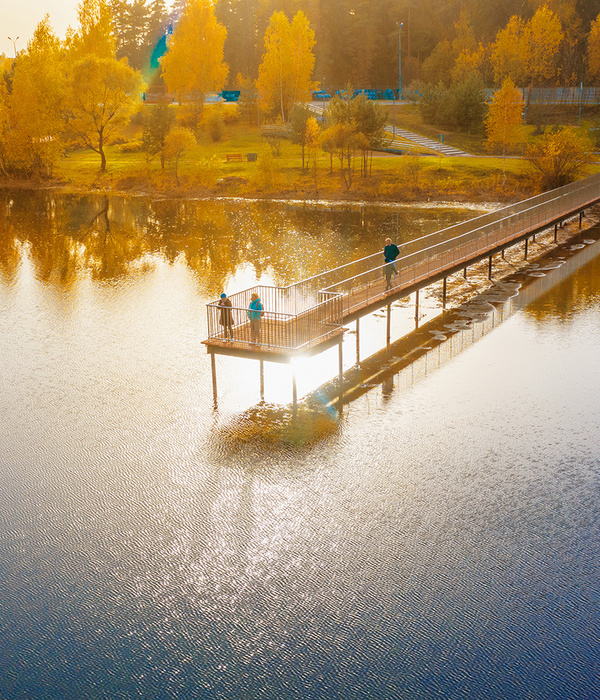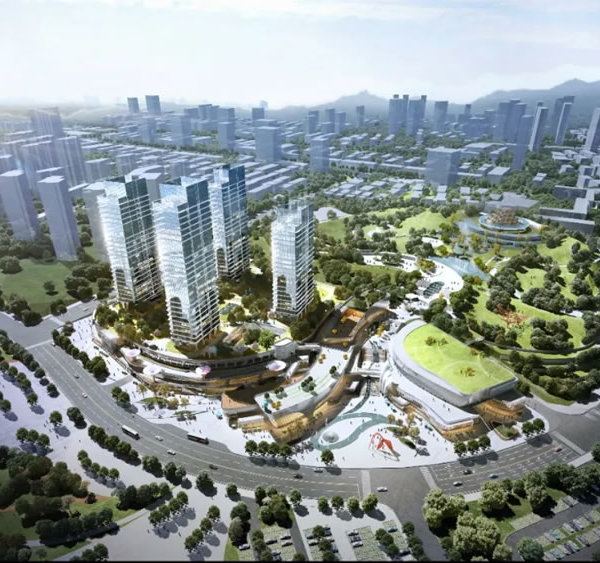阿那亚金山岭位于距离北京120公里之外的承德市滦平县,雄浑山峦包裹的一片谷地间。山林是隔绝外界纷扰的屏障,群山外围则是一直绵延至燕山山脉深处的金山岭长城,残垣断壁历经风霜的烽火台为这方土地带来了另一重围裹与守护,也赋予了山谷村落厚重庄严的历史人文气息。
Aranya Jinshanling is located 120 kilometers away from Beijing, in Luanping County, Chengde City, in a valley surrounded by majestic mountains. The forest is a barrier to the outside world, and on the outskirts of the mountains is the Jinshanling Great Wall, which stretches deep into the Yanshan Mountain Range. The broken walls and weathered beacon towers provide another layer of protection for the land, and also give the village in the valley a solemn historical and humanistic flavor.
▼场地鸟瞰,Aerial view of the site ©三棱镜
金山岭阿那亚整体规划布局成围合状,它拥有集小镇公寓、酒店、业主食堂等建筑的中心小镇作为最内层围合,中心小镇外侧的半山别墅区和精神空间建筑群等构成第二层围合;而在建筑之外是层层叠叠的群山,自然屏障构成的第三层围合。这里像是一个温暖安全的庇护所,让人获得身心的舒展与安宁。
▼场地鸟瞰,Aerial view of the site ©三棱镜
▼建筑与环境特写,Close-up of the building and environment ©三棱镜
The layout of the project is in the shape of an enclosure, with the center town of apartments, hotels, owners’ canteens and other buildings as the innermost enclosure, the villa area and spiritual space complexes on the outside of the center town constituting the second enclosure, and the mountains outside the buildings constituting the third enclosure. It is like a warm shelter for people to get peace of mind and body.
▼雪景,Snow scene ©三棱镜
▼建筑肌理与景观,Building fabric and the landscape ©三棱镜
纬图设计范围自南向北包括西沟区、东沟区、别墅组团、公寓组团等,各个组团零散分布于谷地或山脊间,存在15-30米不同程度高差。景观设计以在地性、低维护、成本可控、通达性、安全性为前提,在充分理解北方山居自然情境之下,利用简约的语言、自然的材料和在地的植物,在山脊与谷地之间创造出一片与自然和建筑高度融合的社区景观空间。
The landscape design area scattered in the valley or between the ridges, there are 15-30 meters of different degrees of height difference. Based on the premise of locality, low maintenance, cost control, accessibility and safety, the designer utilizes simple language, natural materials and local plants to create a community landscape space that is highly integrated with nature and architecture.
▼建筑与景观相得益彰,Building and landscape complement one another well ©三棱镜
见证着数百年历史的古长城近在咫尺,犹如时间的守望者。我们以长城的线形为灵感,提炼出线条串联场地核心点,以烽火台抽离出场所精神,承袭古拙厚重的材料质感。
▼儿童场地草图,Sketch of the children playground ©WTD纬图设计
▼下沉庭院草图,Sketch of sunken courtyard ©WTD纬图设计
Inspired by the linear form of the Great Wall, the designers refined the lines to connect the core points of the site, extracted the spirit of the place with the beacon, and inherited the ancient and heavy material texture. Inspired by the linear form of the Great Wall, the designers refined the lines to connect the core points of the site, extracted the spirit of the place with the beacon, and inherited the ancient and heavy material texture.
▼景观元素特写,Close-up of the landscape elements ©三棱镜
▼公共步道,Public path ©三棱镜
部分景观墙体延续古长城垒石的垒砌方式,模拟出粗糙朴实的肌理。大量铺地延续建筑色系,石材和混凝土等材质作为红砖建筑结构的延续。
Part of the landscape wall is a continuation of the ancient Great Wall, simulating a rough and simple texture. The floor pavement continues the architectural color scheme, with stone and concrete as the continuation of the red-brick building structure.
▼步道入口,Entrance of the path ©三棱镜
▼混凝土光影,Shadow and light of the concrete wall ©三棱镜
在植物的选择和布局中,北京山区寒冷且冬季较长的地理环境和气候因素是金山岭植物设计的重要前提。我们注重自然的变化,让植物的生长过程也成为景观的一部分,增加人与自然的互动性。
In the selection and layout of plants, the cold and long winter geography and climatic factors of Beijing’s mountainous region are important prerequisites for the plant design of Jinshanling. We focus on the natural changes, so that the growth process of plants also becomes part of the landscape, increasing the interaction between man and nature.
▼林荫小道,Avenue ©三棱镜
▼光影关系,Shadow and light ©三棱镜
▼材质特写,Close-up of the materials ©三棱镜
植物设计师在长达三年的落地过程中,多次进行小范围植物试验,反复总结植物过冬的生长情况、存活密度之后,挑选出包括白桦、榆树、五角枫、铺地柏等耐低温、观赏性佳、低维护成本的植物,最终呈现地被层稀薄野放,部分土壤自然裸露的山野植被状态。
During the three-year-long construction process, the plant designer conducted several small-scale plant tests to summarize the growth and survival density of plants over the winter, and selected low-temperature-resistant, ornamental, and low-maintenance plants, ultimately presenting the state of mountainous vegetation with a thin layer of groundcover and a part of the soil naturally exposed.
▼植物设计,Plants design ©三棱镜
场地左右两侧山体坡度大,易形成季节性汇水洼地。我们重新梳理防洪体系,利用设置于地形沟谷之间的积水塘,收集拦截部分雨水通过蓄水、滞留、下渗等方式帮助后续设施的错峰调蓄;其次,截水沟可以利用地势收集雨水通过管道引入雨水花园,超负荷雨水通过雨水花园的溢流井排入排洪系统。
The slopes of the hills on the left and right sides of the site are large, making it easy to form seasonal catchment depressions. We re-combine the flood control system, using the ponds set between the topographic gullies to collect and intercept part of the rainwater through water storage, retention and infiltration to help the subsequent facilities of the staggered storage; secondly, the interceptor ditch can be utilized to collect rainwater from the terrain through the pipeline introduced into the rain garden, and overloaded rainwater discharged through the overflow wells of the rain garden into the flood control system.
▼植物设计,Plants design ©三棱镜
在满足雨水花园容积条件下,如还有超额部分的雨水,则抽至山体进行滴灌,利用植物消耗、地表蒸发、土壤下渗等方式进行处理。雨水花园根据溪流方向重新整合地形,它解决了蓄水问题,也完成了自然到人工的过度。
Under the condition of meeting the volume of the rain garden, if there is still an excess portion of rainwater, it is pumped to the mountain for drip irrigation, utilizing plant consumption, surface evaporation, and soil infiltration. The rain garden reintegrates the terrain according to the direction of the stream, it solves the problem of water storage and accomplishes the gradual transition from natural to artificial.
▼地面铺装,Pavements ©三棱镜
功能性公共空间设计充分结合虑了社区人群的日常需求,包含了聚会、社交、漫步、观景、儿童活动等动静相宜的空间,设计延续质朴的语言去塑造灵动多功能活动场所,激发社区活力。
The design of the functional public space is fully integrated with the daily needs of the community, including spaces for gathering, socializing, strolling, viewing, children’s activities, etc. The design continues the simple language to shape the dynamic activities to stimulate the vitality of the community.
▼活动场所,Public spaces ©三棱镜
其中最大活动区域位于北边界,边界之外则是陡峭壮观的山体崖壁,这个空间具有登高眺望的天然优势,基于此,我们呈现了一个集合观景眺望、休闲玩乐、亲子陪伴功能的景观构筑。活动区内配置有儿童玩耍装置和家长看护区,休闲落座区,方便日常亲子社交。
The largest activity area is located at the north boundary, beyond which is a steep and spectacular mountain cliff, so this space has the natural advantage of an elevated view, and we therefore present a landscape structure that combines the functions of observation, leisure, and personal companionship. The activity area is equipped with children’s play equipment and parental care area, and leisure seating area, which is convenient for daily parent-child socialization.
▼装置特写,Close-up of the installation ©三棱镜
▼由步道望向装置,Viewing the installation from path ©三棱镜
▼装置特写,Close-up of the installation ©三棱镜
▼木材与混凝土结合,Combination of wood and concrete materials ©三棱镜
另一处儿童活动区位于公寓组团的餐厅下沉庭院,一个连接上下空间的竖向通道,同时又是餐厅外部的大型烟道、空调暖气等功能性设备摆放区。设计在此需要解决三大问题:上下交通动线,管道包裹隐藏,植入儿童玩耍趣味,最终创造出了一个极具趣味探索的粉红色立体儿童活动空间。
Another children’s activity area is located in the sunken courtyard of the restaurant of the apartment group, which is a vertical passage connecting the upper and lower spaces, and at the same time, it is also an area for placing the large flue, air conditioner and heating equipment outside the restaurant. The design needs to solve three major problems here: up and down traffic flow; pipe wrapping and hiding; and implanting children’s playfulness, finally creating a pink three-dimensional children’s activity space that is very interesting to explore.
▼粉红色儿童空间,Pink children activity space ©三棱镜
金山岭项目是阿那亚对于依山而居的全新探索,意在创造一个山谷中的精神栖息地。纬图在该项目中的设计是克制的,我们并不追求纯粹的“形”,也无绝对的“视觉焦点”,而是创造出一种它原本就生长在此的场域风貌,让景观以一种润物细无声的方式融入自然与建筑。人们在山谷自然中,闻潺流、柴崩、鸟鸣、沸鸣、雪融,感受大自然的力量。
The Jinshanling project is Ayanya’s new exploration of living in the mountains, with the intention of creating a spiritual habitat in the valley. Landscape design does not pursue pure form, but creates a kind of field style where it originally grows, so that the landscape is integrated into nature and architecture in a silent way. In the nature of the valley, people can smell the gurgling streams, firewood collapse, birdsong, boiling, snow melting, and feel the power of nature.
▼粉红色儿童空间,Pink children activity space ©三棱镜
▼装置细部,Details of the installation ©三棱镜
▼模型,Model ©WTD纬图设计
项目名称:阿那亚·金山岭 项目地址:河北承德市滦平县 业主单位:阿那亚 景观设计:WTD纬图设计 设计团队:李卉 李彦萨 田乐 侯茂江 李丹丹 王璐 陈奥男 何美松 魏琳峰 李理 李超 童征 曹燕张华盛 王园园 范执鸿江季航陈妃 陈思丞张书桢 兰明姝 王利如 潘俊岑 於文鑫 宋照兵 李艾峻 建筑设计:上海建言建筑设计有限公司/大连建筑设计研究院 景观面积:61651.9㎡ 建成时间:2023.10 摄影:三棱镜
Project Name: aranya jinshanling Address: Luanping County, Chengde City, Hebei Province Owner: aranya Landscape Design: WTD GROUP Design Team: LiHui,LiYansa,TianLe,HouMaojiang,LiDandan,WangLu,ChenAonan,HeMeisong,Wei Linfeng,LiLi,LiChao,TongZheng,CaoYan,ZhangShuzhen,LanMingshu,WangLiru,PanJunzen,YuWenxin,SongZhaobing,LiAijun Architectural Design: Shanghai Jianyin Architectural Design Studio/Dalian Architectural Design Institute Landscape area:61651.9㎡ ㎡ Completion time: 2023.10 Photography: PRISM photography
{{item.text_origin}}

